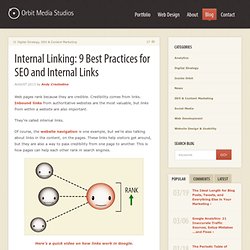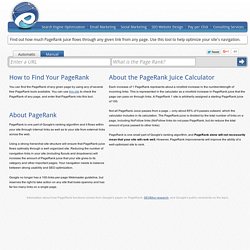

Internal Linking SEO Best Practices. Web pages rank because they are credible.

Credibility comes from links. Inbound links from authoritative websites are the most valuable, but links from within a website are also important. They’re called internal links. Of course, the website navigation is one example, but we’re also talking about links in the content, on the pages. These links help visitors get around, but they are also a way to pass credibility from one page to another. Here’s a quick video on how links work in Google. Some of your pages have more “link popularity” than others, and so they have more credibility to pass on through internal links. Yes, that may be the weirdest lingo in web marketing, but it’s important. Internal Linking Best Practices Here are nine best practices for internal linking. What should these links look like? 1. 2. 3. How many links should I add? 4. 5. Where should I put these links? 6. 7. 8.
Tip: Use Google to search your own site for related pages: “site:www.yoursite.com [keyword].” PageRank Link Juice Calculator - Ecreative Internet Marketing. How to Find Your PageRank You can find the PageRank of any given page by using any of several free PageRank tools available.

You can use this site to check the PageRank of any page, and enter that PageRank into this tool. About PageRank PageRank is one part of Google's ranking algorithm and it flows within your site through internal links as well as to your site from external links across the web. Using a strong hierarchal site structure will ensure that PageRank juice flows optimally through a well organized site.
Google no longer has a 100-links-per-page Webmaster guideline, but reserves the right to take action on any site that looks spammy and has far too many links on a single page. About the PageRank Juice Calculator Each increase of 1 PageRank represents about a ninefold increase in the number/strength of incoming links. Not all PageRank Juice passes from a page -- only about 85% of it passes outward, which the calculator includes in its calculation.
How to Research Keywords. That web page isn’t going to rank itself!

Search engine traffic is the outcome of a set of deliberate steps. It’s not as complicated or mysterious as you’d think. There are three key ingredients behind every listing in every search results page: The keyword (keyphrase research)The content on the page (on-page SEO)The trustworthiness of the website (link popularity / domain authority) In order to rank, a page must indicate its relevance to search engines, and the website itself must be credible in the eyes of search engines. What do people really call your product or service? As a content marketer, the two primary uses for keyword research are to find phrases to include in your content and to get ideas for new content. The Perfect Target Keyword The goal of keyword research is to find a phrase that meets these criteria: many people are searching for it (high search volume), and you have a realistic chance of ranking relative to other sites (low competition).
Step 1: Start Broad Step 3.